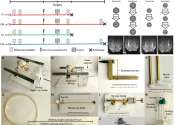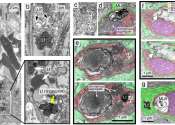Last update:
Parkinson's & Movement disorders news
Neuroscience
New evidence about dopamine delivery explains why current Parkinson's treatments succeed—and their limitations
A McGill-led study is challenging a popular theory about how dopamine drives movement, a discovery that could shift how scientists think about Parkinson's disease treatments.
Dec 17, 2025
0
64
Parkinson's & Movement disorders
New ALS diagnostic blood test boasts 97% accuracy
ALS is a debilitating paralytic disease characterized as the death of upper and lower motor neurons. Fortunately, ALS is relatively rare, with an incidence rate of 1.6 per 100,000 adults, resulting in about 30,000 cases in ...
Dec 16, 2025
0
0
RNA 'quality control' system breaks down in ALS, study finds
A Northwestern Medicine study has shed light on a critical molecular mechanism underlying amyotrophic lateral sclerosis (ALS), according to findings published in the journal Neuron.
Dec 15, 2025
0
30

Gene therapy for hereditary spastic paraplegia hits proof-of-principle milestone
There is no cure for the rare disease Hereditary Spastic Paraplegia (HSP), but researchers from Drexel University's College of Medicine and the UMass Chan Medical School have achieved proof-of-principle success with "silence ...
Dec 15, 2025
0
3

Running boosts dopamine and coordination in aging mice, providing potential insight into Parkinson's disease
The brain-chemical surge that comes with running may bolster coordination and speed in the old and young alike, a new study of middle-aged mice shows. Such physical activity may help restore ease of movement and agility, ...
Dec 9, 2025
0
38

Machine learning models could help diagnose ALS earlier through blood biomarkers
Using machine learning models, researchers at Michigan Medicine have identified a potential way to diagnose amyotrophic lateral sclerosis, or ALS, earlier from a blood sample, a study suggests.
Dec 9, 2025
0
31

Aging midbrain neurons face energy crisis linked to Parkinson's
Dopamine neurons in a part of the brain called the midbrain may, with aging, be increasingly susceptible to a vicious spiral of decline driven by fuel shortages, according to a study led by Weill Cornell Medicine investigators. ...
Dec 8, 2025
0
18

Gene therapy improves movement in kids with spinal muscular atrophy
A single-dose gene replacement therapy is found to improve movement ability in children over 2 years of age and teenagers with spinal muscular atrophy, according to research published in Nature Medicine. The results of this ...
Dec 8, 2025
0
0

Slow turning could be an indicator for Parkinson's disease
An international study has found that wearable technology could help detect Parkinson's disease (PD) up to nine years before clinical diagnosis simply by monitoring how people turn when they walk.
Dec 8, 2025
0
1

Early Parkinson's predictor found in daily step count
Oxford's Big Data Institute and Nuffield Department of Population Health report that daily step counts may help identify who will later be diagnosed with Parkinson's disease, with lower activity patterns acting as an early ...

Dance effective in fighting against cognitive decline in Parkinson's, study finds
A new study led by researchers at York University shows that dance can be beneficial in halting the cognitive decline associated with Parkinson's disease and, for some participants, they even showed signs of improvement. ...
Dec 5, 2025
0
49

Essential tremor movement disorder linked to loss of Purkinje brain cells
Essential tremor (ET) is a common movement disorder affecting about 2% of the American population, and more than 20% of those over 90 years old. Despite its prevalence and decades of study, researchers don't know the precise ...
Dec 5, 2025
0
0

Cracking the code of Parkinson's: How supercomputers are pointing to new treatments
More than 1 million Americans live with tremors, slowed movement and speech changes caused by Parkinson's disease—a degenerative and currently incurable condition, according to the Parkinson's Foundation and the Mayo Clinic. ...
Dec 3, 2025
0
23

In-home sensor technology offers smarter care for ALS patients
Bill Janes is on a mission to improve life for people with amyotrophic lateral sclerosis (ALS). As a licensed occupational therapist and researcher at the University of Missouri, he's seen firsthand how the disease can steal ...
Dec 2, 2025
0
0

Q&A: New diagnostics and treatments for ALS and dementia—a key protein may point the way
The two neurodegenerative diseases could not appear more different. Amyotrophic lateral sclerosis (ALS), sometimes called Lou Gehrig's disease, affects the muscles, ultimately paralyzing people with the disorder. Frontotemporal ...
Nov 27, 2025
0
0

Protein ubiquilin-2 found to promote Parkinson's-linked α-synuclein aggregation
Parkinson's disease (PD) is an age-related, progressive neurodegenerative disorder. The hallmark of PD pathogenesis is the Lewy bodies (LBs) that accumulate in neurons in the substantia nigra region of the brain, damaging ...
Nov 26, 2025
0
0

Brain markers could yield early clues into Parkinson's disease
Parkinson's disease affects more than 1.1 million people in the United States, progressively damaging the brain cells that control movement. By the time symptoms like tremors appear, patients have already lost around half ...
Nov 25, 2025
0
0

'Zap-and-freeze' technique successfully used to watch human brain cell communication
Researchers at Johns Hopkins Medicine say they have used a "zap-and-freeze" technology to watch hard-to-see brain cell communications in living brain tissue from mice and humans.
Nov 24, 2025
0
15

Researchers reveal progressive, regional brain changes in Parkinson's disease
New research has revealed that Parkinson's disease causes significant and progressive changes to blood vessels in the brain, changing our understanding of the disease which may lead to new treatment methods.
Nov 24, 2025
0
0

Untreated sleep apnea raises risk of Parkinson's, study finds
New research reveals that people with untreated obstructive sleep apnea have a higher risk of developing Parkinson's disease. However, they can significantly reduce the risk by improving the quality of their sleep by using ...
Nov 24, 2025
0
0

Pause and rewind: How the brain keeps time to control action
Whether speaking or swinging a bat, precise and adaptable timing of movement is essential for everyday behavior. Although we do not have sensory organs like eyes or a nose to sense time, we can keep time and control the timing ...
Nov 19, 2025
0
98

Evidence builds for disrupted mitochondria as cause of Parkinson's
For decades, scientists have known that mitochondria, which produce energy inside our cells, malfunction in Parkinson's disease. But a critical question remained: do the failing mitochondria cause Parkinson's, or do they ...
Nov 17, 2025
0
50

Next-generation microbiome medicine may transform Parkinson's treatment
The age-old advice to "trust your gut" could soon take on new meaning for people diagnosed with Parkinson's disease, thanks to a creative feat of bioengineering by researchers in the University of Georgia's College of Veterinary ...
Nov 17, 2025
0
80

What polymers can teach us about curing Alzheimer's disease
Researchers from Tokyo Metropolitan University have applied ideas from polymer physics to illuminate the mechanism behind a key pathology in Alzheimer's disease, the formation of fibrils of tau proteins. They showed that ...
Nov 17, 2025
0
40

New genetic test targets elusive cause of rare movement disorder
Scientists at Brigham and Women's Hospital and Harvard Medical School have developed a targeted genetic test to improve diagnosis for X-linked dystonia-parkinsonism (XDP), a rare and disabling movement disorder that affects ...
Nov 15, 2025
0
31










































